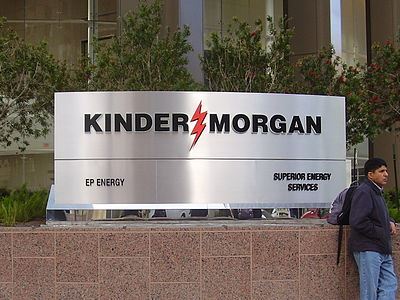
Using the United States Oil Fund ETF (NYSEMKT: USO) as a proxy for crude prices and the United States Natural Gas Fund ETF (NYSEMKT: UNG) as a proxy for natural gas prices, the drop in oil prices since the beginning of this year totals 28%. Kinder Morgan’s stock price is down almost 29%. Natural gas has fared somewhat better, down about 14% since January.
A substantial majority of Kinder Morgan’s pipeline transportation business is related to natural gas. Three-quarters of the company’s cash flow is based on take-or-pay contracts. That means the producer/shipper pays for capacity on the pipeline whether it uses the capacity or not. Kinder Morgan expects $5.3 billion of its budgeted earnings of $8.2 billion to come from take-or-pay contracts. Another $1.8 billion is expected from fee-based cash flow for natural gas and refined products transportation and storage.
According to the company’s presentation, every change of $1 per barrel of oil results in a $10 million change to Kinder Morgan’s distributable cash flow (DCF). Similarly, a change of $0.10 per million BTUs in the price of natural gas has an impact of $3 million on DCF.
ALSO READ: 5 Oil and Gas Stocks Analysts Want You to Buy Now
Kinder Morgan expects to pay an annual dividend of $2 per share in 2015, 15% higher than in 2014 and representing excess coverage of about $654 million. The expected dividend assumes a West Texas Intermediate (WTI) crude oil price of $70 a barrel and a natural gas price of $3.80 per million BTUs. The much lower commodity prices in the first half of 2015 forced the company to give up on its excess coverage forecast at the end of the second quarter, but Kinder Morgan continues to say it will increase its dividends by 10% in each year from 2016 through 2020.
So, while natural gas prices are down about 14% since January, Kinder Morgan’s share price is down by twice as much. Is there a disconnect between the value that the company puts on itself and the value attributed to it by the market? With natural gas prices about $1 dollar per million BTUs below the company’s budgeted forecast, the impact on DCF amounts to about $30 million. Compared with second-quarter 2014 earnings before depreciation and amortization (EBDA), second-quarter earnings were down by $41 million, down just over 2% compared with the same quarter a year ago.
Kinder Morgan is performing about where the company projected it to be, and it’s not really that much worse than a year ago, even though commodity prices are way down. It may have a point when it says that the market undervalues it.
Shares traded down about 0.1% late Monday morning, at $30.05 in a 52-week range of $28.50 to $44.71.
ALSO READ: 4 Oil and Gas Stocks That Should Outperform During Interest Rate Hikes
Thank you for reading! Have some feedback for us?
Contact the 24/7 Wall St. editorial team.



